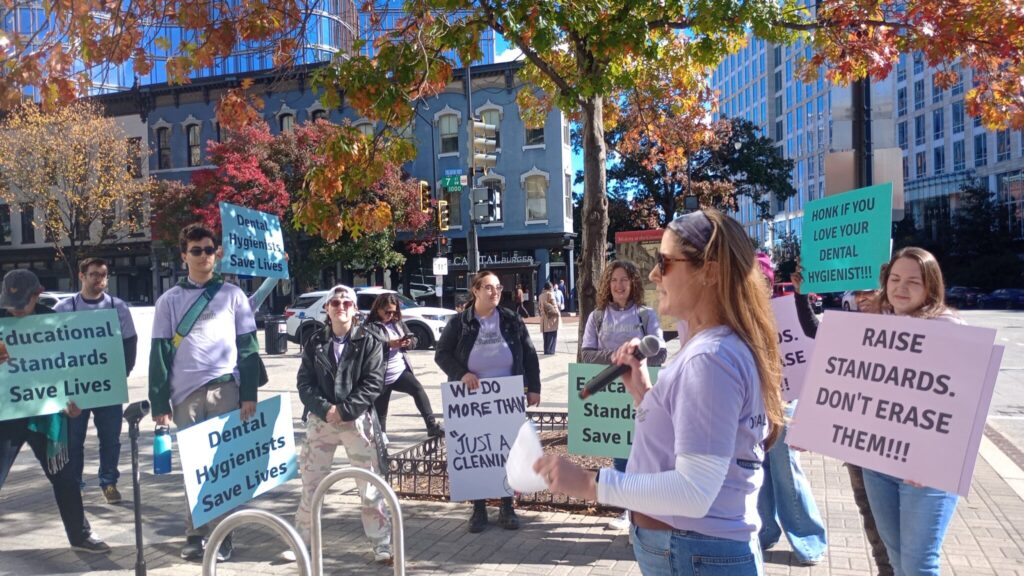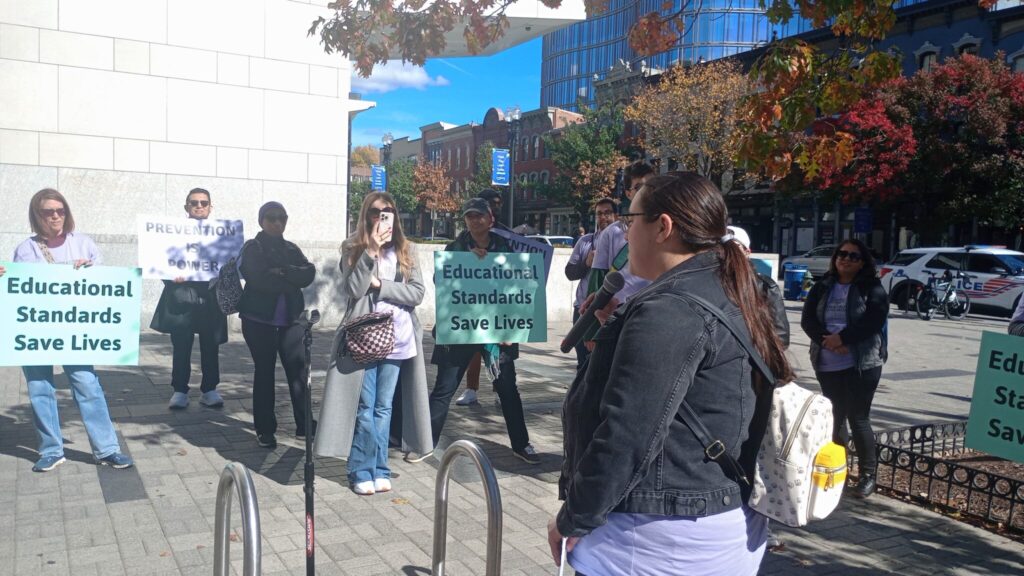
“Academic requirements save lives,” and “Increase requirements, don’t erase them,” learn the indicators carried by about 50 dental hygienists who gathered in Washington, D.C., on Oct. 25.
The demonstration, organized by the non-profit Oral Well being Consciousness Projec (OHAP), happened throughout the American Dental Affiliation’s SmileCon and 2025 Home of Delegates assembly to carry wider consideration to the difficulty. The group, formally shaped in June 2025 after gaining traction on social media, goals to oppose efforts they are saying would decrease or bypass the Fee on Dental Accreditation (CODA)’s practically 3,000-hour instructional requirement for dental hygienists—sometimes accomplished by way of a two-year affiliate’s or four-year bachelor’s diploma.
Though the rally was primarily made up of dental hygienists, quite a few dentists and public coverage college students additionally attended, in response to organizers.
“We even had dentists come out to fulfill with us,” mentioned Lisandra Maisonet, BS, RDH, PHDHP, EFDA, government director of OHAP. “They advised us they’re on our facet in terms of defending instructional requirements.”
“OHAP started as a motion — hygienists from throughout the U.S. coming collectively on-line to defend instructional requirements and shield sufferers,” Maisonet added. “We’re not a union or an affiliation; we’re a collective voice saying, ‘our sufferers deserve care from absolutely educated professionals.’”
Maisonet mentioned OHAP’s objective is to coach each legislators and the general public on the preventive and diagnostic experience dental hygienists carry to affected person care.
“We weren’t created to compete with the American Dental Hygienists’ Affiliation,” she mentioned. “OHAP exists to guard sufferers — to verify the individuals caring for them have the appropriate training and coaching. The ADHA represents our occupation; we’re targeted on defending the general public.”
Office elements behind the so-called scarcity
Each the American Dental Affiliation (ADA) and the ADHA have acknowledged a scarcity of practising dental hygienists in america. The ADHA’s 2024 workforce place assertion notes that 24.7 million Individuals reside in dental-care scarcity areas, whereas 1.7 million can not entry care inside a 30-minute drive, and that periodontal illness prices $154 billion yearly in misplaced productiveness.
Final 12 months, the ADA handed a decision permitting foreign-trained dentists to work as dental hygienists — a transfer rejected by the ADHA, which submitted written testimony to CODA opposing adjustments that may let internationally skilled suppliers bypass accredited packages.
Associated: Hygienists push again on name to permit foreign-trained dentists to offer preventive care
Associated: Document numbers: 2024 is the best in 5 years for foreign-trained dentists immigrating to Canada
Proposals have continued. Nevada’s Senate Invoice 495, which might have permitted licensure with out CODA accreditation, failed earlier this 12 months following opposition from the ADHA and the Nevada Dental Hygienists’ Affiliation. In October, the ADHA’s board reaffirmed assist for CODA-accredited training and rejected any “preceptor coaching” or Alabama Dental Hygiene Program (ADHP)-type pathways that circumvent these necessities. The ADHP stays the one non-CODA path to licensure within the U.S.
Maisonet mentioned such proposals miss the true difficulty.
“I don’t consider we’re going through a real scarcity of dental hygienists — we’re going through a scarcity of excellent working circumstances,” she mentioned. “If extra practices supplied advantages, paid trip and a supportive setting, we’d see many hygienists return to the chair.”
“There are greater than 200,000 licensed dental hygienists within the U.S.,” she added. “The issue isn’t numbers — it’s that many go away non-public observe as a result of they don’t obtain advantages, paid day without work or respect for his or her scientific experience. If dental workplaces improved working environments and handled hygienists as integral members of the care group, we’d remedy a lot of the so-called scarcity in a single day.”

The chance of inconsistency
Anne O. Rice, RDH, BS, FAAOSH, CDP, a member of OHAP’s 22-member job pressure, mentioned affected person security is on the coronary heart of the group’s issues.
“When different licensing fashions for dental hygienists are launched, the best dangers to affected person care typically come from inconsistency,” Rice mentioned. “Our occupation was constructed on a robust basis of training, scientific competency and licensure requirements designed to guard the general public. If these benchmarks are diluted or differ extensively from state to state, we danger creating confusion for sufferers — and even amongst suppliers — about what providers can safely be delivered.”
She added that insufficient coaching pathways may result in “fragmentation of care,” affecting accountability and continuity in analysis and prevention.
“Why spend money on the training, debt and duty of turning into a licensed dental hygienist if anybody can carry out the identical providers with much less preparation?” she requested. “Excessive requirements entice excessive expertise. If we would like sustainable practices, we have to shield the worth {of professional} training — not undermine it.”
Associated: From scaler to spatula: Why dental hygienists aren’t quitting the occupation—however the office
Associated: U.Okay. dental group: International-trained dentists ought to work in clinics, not McDonald’s
‘Entrance line of preventive medication’
One other OHAP board member Melissa Obrotka, BA, RDH, ICP Coach, mentioned the motion underscores how dental hygiene is central to whole-body well being.
“Dental hygiene is the entrance line of preventive medication,” Obrotka mentioned. “Within the chair, we don’t simply scrape and polish enamel; we detect irritation, an infection and early indicators of systemic illness that may change the course of somebody’s well being. That duty calls for accredited training, evidence-based coaching and scientific excellence. Diluting these requirements dangers greater than public belief — it dangers lives.”
Maisonet mentioned the D.C. rally marks just the start.
“We’re constructing a military of hygienists prepared to talk to legislators, educate their sufferers and arise for the requirements that shield public well being,” she mentioned. “This isn’t about competitors — it’s about collaboration and integrity in affected person care.”